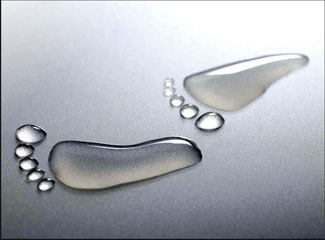|
Variety
Water footprint?
The water footprint (WF) is a measure of the total volume of
freshwater used to produce goods and services.
People use lots of water for drinking, cooking and washing, but even
more for producing things such as food, paper, cotton clothes and so on.
So, the water footprint is an indicator of water use that looks at both
direct and indirect water use of a consumer or producer. The water
footprint of an individual, community or business is defined as the
total volume of freshwater that is used to produce the goods and
services consumed by the individual or community or produced by the
business.
Virtual water and water footprint

Virtual water is the amount of water that is embedded in food or
other products needed for its production.
The water footprint is a term that refers to the water used to make a
product. In this context we can also speak about the ‘virtual water
content’ of a product instead of its ‘water footprint’.
The water footprint concept, however, has a wider application.
We can for example speak about the water footprint of a consumer by
looking at the water footprints of the goods and services consumed or
about the water footprint of a producer (business, manufacturer, service
provider) by looking at the water footprint of the goods and services
produced by the producer. Furthermore, the water footprint concept does
not simply refer to a water volume only, as in the case of the term
‘virtual water content’ of a product.
The water footprint is a multidimensional indicator, not only
referring to a water volume used, but also making explicit where the
water footprint is located, what source of water is used, and when the
water is used. The additional information is crucial in order to assess
the impacts of the water footprint of a product.
The water footprint refers to the volumes of water consumption and
pollution that are ‘behind’ your daily consumption.
The water footprint of humanity has exceeded sustainable levels at
several places and is unequally distributed among people. There are many
spots in the world where serious water depletion or pollution takes
place: rivers running dry, dropping lake and groundwater levels and
endangered species because of contaminated water.
Water footprint reduction at home
As a consumer there are many ways you can reduce your ‘direct water
footprint’ (home water use) by installing water saving toilets, applying
a water-saving shower head, closing the tap during tooth brushing, using
less water in the garden and also by not disposing medicines, paints or
other pollutants through the sink.
Your ‘indirect water footprint’ – the water consumption and pollution
behind all the goods you buy – is much larger than your direct water
footprint at home. You have basically two options to reduce your
indirect water footprint.
One option is to substitute a consumer product that has a large water
footprint by a different type of product that has a smaller footprint.
Examples: eat less meat or become a vegetarian, drink tea instead of
coffee, or even better drink plain water. And replacing cotton clothes
by clothes from artificial fiber saves a lot of water.
However, as this approach has limitations, because you may find it
difficult to drastically change your consumption pattern.
There is a solution;you can select the cotton, beef or coffee that
has a relatively low water footprint or that has its footprint in an
area that doesn’t have high water scarcity.
This too may prove difficult as it requires that retailers to
provideyou with proper information to make such choices.
So, what you can do is use water sparingly and avoid polluting this
dwindling resource that is the life giver on Planet Earth.!
What do you prefer - reading or watching television ?
“ Reading maketh a full man,” is a famous proverb which highlights
the benefits of reading. When we read even a small section of a
newspaper or a magazine we can enrich our knowledge. It is important to
cultivate the habit of reading to enhance one’s knowledge as well as the
vocabulary. It has been proven that books increase the power of
imagination because when we read, we automatically start to imagine what
is written in the book. This paves the way to sharpen our minds.
 Television is an introduction of modern technology and is used in
most homes. We could even say that today it has become a necessary evil
in our lives as many simply cannot do without it. It plays a major role
in the lives of many adults and children who are addicted to it. Television is an introduction of modern technology and is used in
most homes. We could even say that today it has become a necessary evil
in our lives as many simply cannot do without it. It plays a major role
in the lives of many adults and children who are addicted to it.
Most people sit in front of the television or the ‘idiot box ‘as it
is often called, to find relaxation and entertainment. However, there is
a great doubt as to whether T.V. programmes, especially the numerous
soaps and teledramas really satisfy the needs of viewers. Of course,
there are many programmes that help enhance one’s knowledge too. The
viewer must be selective of the programmes .
Reading and watching television are two ways of enhancing knowledge
and being entertained. So, what is the difference between these two
modes of media? One obvious difference is that television does not help
us hone in on our imaginative skills because the visuals explain
everything.
We do not attempt to think or imagine beyond what we see on the
screen. Reading however makes us think and analyse the various
situations and characters portrayed in the story. For example, when we
read a story such as ‘Oliver Twist ’by Charles Dickens, even though we
feel annoyed with Nancy for bringing Oliver back into their gang, we
also feel sympathy towards her when she sacrifices her life to save him
at the end. We are forced to read and interpret different situations and
behaviour of the people when we read .The skills we develop by reading
aid us in real life situations too.
Television too has the ability to evoke our emotions and keep us
entertained but most often the fascination is only short lived . Whereas
with books we could read the story over and over again .
Scientists have proved through many experiments that watching too
much television is harmful. It could have an adverse impact especially
on our eyesight. So, going by all the negative and positive impacts of
these two modes of media, you must choose the best mode to light up your
future. You can experiment how they effect you and come to a conclusion
about what is best. In my opinion,reading is the best means to pave the
way for a bright future.
- Theja Dilhani Kapuruge |

